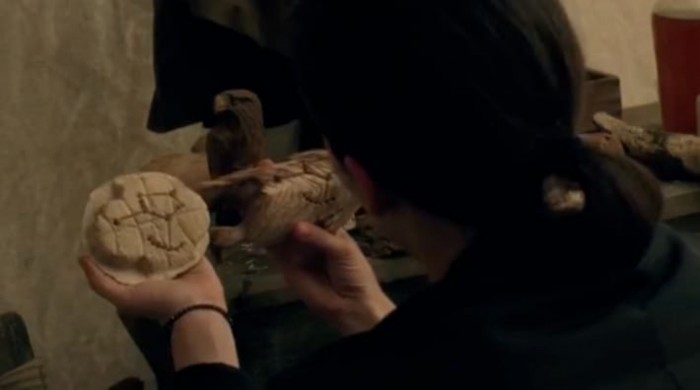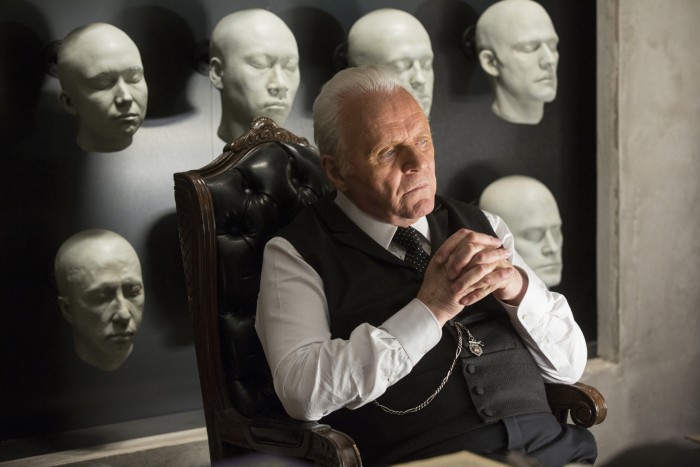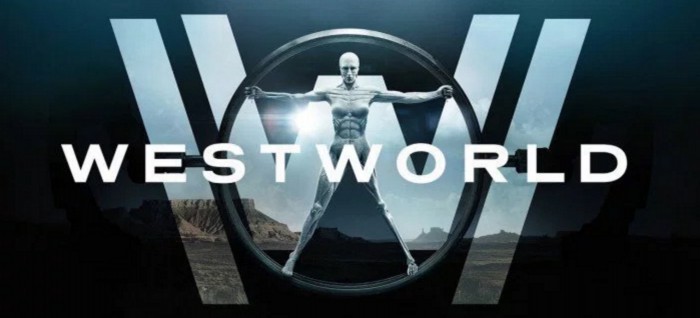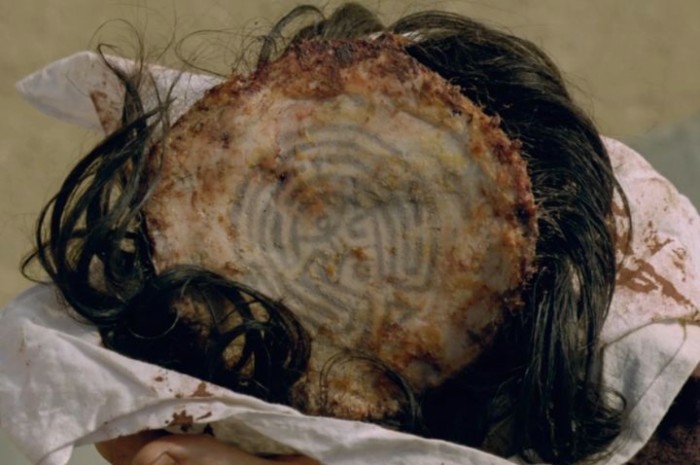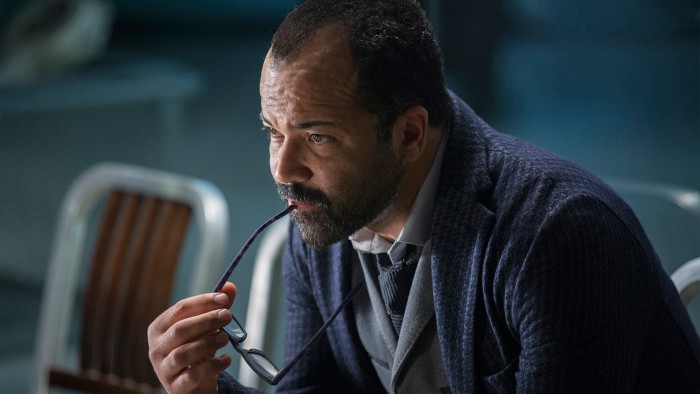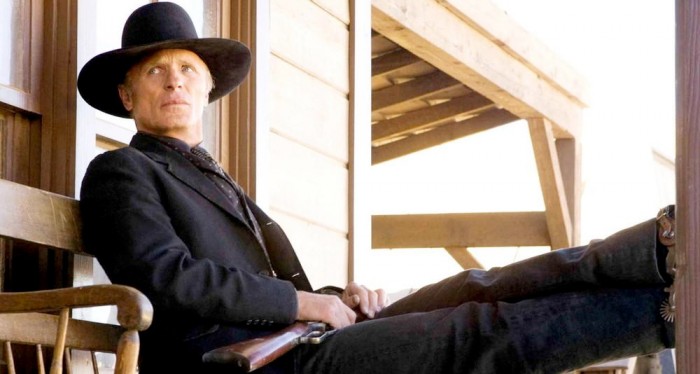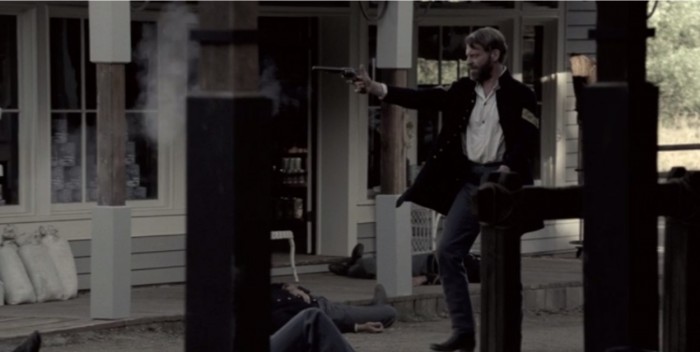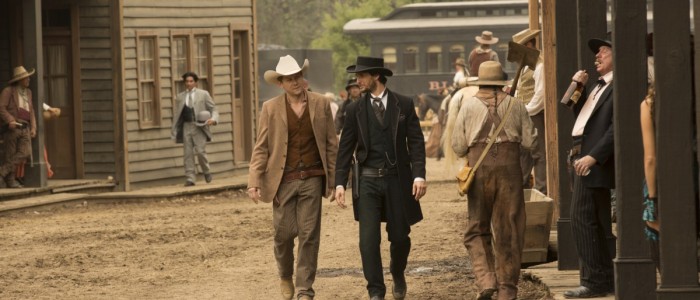'Westworld' Theories: Who Is Arnold? Where Does The Maze Lead? And How Is Orion Connected?
Westworld is certainly a show that presents the audience with many mysteries and just as many questions, something we've come to expect from Bad Robot and Jonathan Nolan. We're only three episodes into the first season of this HBO series adaptation, and already we've seen our fair share of Westworld theories. Some theories question the location and time of this story, while others try to draw connections between the characters. Some of the most exciting theories may already be debunked (or were they?) . And other theories have been directly addressed by the showrunners Jonathan Nolan and Lisa Joy Nolan, who would neither confirm or deny your assumptions.
With a couple of days to digest the third episode, "The Stray," we have rounded up a new batch of Westworld theories for you to consider. In this edition we ask the big question of "Who is Arnold?" and how will his presence impact the future of this series? Also, where does the Maze lead and how does the constellation of Orion connect with what we know so far about the Westworld backstory? All this and more, after the jump.
Orion Might Be A Clue
The title of the episode "The Stray" comes from the storyline of a stray host had randomly started inscribing a constellation (Orion) and wandered off from his group and looped storyline. What might the constellation of Orion tell us about the story going forward?
/Film reader Gary R mentions that in Greek mythology, Orion was a hunter who was killed by Artemis and placed among the stars as the constellation of Orion by Zeus. The giant was born a twin, alongside Apollo, on an island called Delos. As you might remember, the company that runs Westworld is named Delos. Also, a NASA mission to Mars planned for the 2030's, which has been in development since 2011, is called Orion. Is this just a coincidence or does this further substantiate the previous theory that Westworld is on another planet, like Mars?
Who Is Arnold?
The biggest new mystery introduced in "The Stray" is Arnold.
The hosts who are going off script are talking an imaginary man named Arnold. Later in the episode, Doctor Ford (Anthony Hopkins) finally tells his protege Bernard Lowe (Jeffrey Wright) about Arnold, who co-founded Westworld but was removed from the history books. It was explained that at first they were developing the technology for Westworld without any board meetings or oversight, something Ford describes as glorious years of "pure creation."
Short aside: This exact wording was used in Jonathan Nolan's brother Christopher Nolan's 2010 film Inception, employed by Ellen Page's character Ariadne. It's interesting that this exact phrase is used again in another Nolan project. It's worth noting that while Jonathan doesn't have a screenwriting credit on Inception, it's possible he did an uncredited polish for his brother, and it's not uncommon for writers to unconsciously reuse bits of dialogue in their projects. Or, it could just be a coincidence. Moving on...
Arnold wasn't interested in the appearance of intellect or wit — he wanted the real thing, he wanted to create consciousness," allowing hosts to hear their own programming as inner monologue (i.e., the bicameral mind). According to Ford, you don't want the hosts conscious in this kind of environment. The "only vestiges that remain" of his theory around "boot-strapping" consciousness are "the voice commands" the programmers use to control the A.I. And we're to assume that the recent glitches in hosts may be signs of Arnold's old code resurfacing.
Will Arnold Show Up In Westworld?
Could we expect to see someday Arnold show up in Westworld? Ford says he died in the park, his "search for consciousness consuming him totally." How did he die? We're not told; Ford only says that "we called it an accident, but I knew Arnold, he was very, very careful." Can we trust Doctor Ford's story? Is Arnold dead? Ford may not be telling the truth, or at very least, not the full truth (remember, Ford says earlier in the episode that "a fiction that, like all great stories, is rooted in truth.").
Will we see Arnold again in Westworld, in any form? Jonathan Nolan was asked this question directly by EW, and the showrunner bluntly responded that "I think that's unlikely." While he says so dismissingly, he doesn't outright say it won't happen.
The Maze The Key To Consciousness
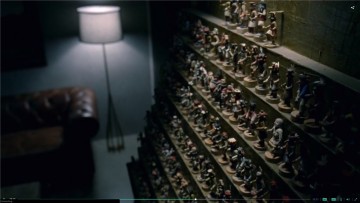 The maze image in Westworld is a riff on the O'odham myth of the "Man in the Maze." As PetrusDran points out on Reddit, anyone who lives in the Southwest would recognize the image immediately as its on a lot of products in the area of the country, including belt buckles. Did anyone else notice Ford's rather extensive collection of miniature Hopi kachina dolls in "The Stray?"
The maze image in Westworld is a riff on the O'odham myth of the "Man in the Maze." As PetrusDran points out on Reddit, anyone who lives in the Southwest would recognize the image immediately as its on a lot of products in the area of the country, including belt buckles. Did anyone else notice Ford's rather extensive collection of miniature Hopi kachina dolls in "The Stray?"
According to Wikipedia, "I?itoi or I?ithi is, in the cosmology of the O'odham peoples, the mischievous creator god who resides in a cave below the peak of Baboquivari Mountain, a sacred place within the territory of the Tohono O'odham Nation." Some fans have noticed the similarity to the Mesa Gold, Delos' behind the scenes facilities in Westworld.
The Man in the Maze motif appears frequently in contemporary crafts and art of the American Southwest, most prominently by Tohono O'odham silversmiths in rings and other jewelry and by Akinel O'odham artisans in baskets. Among these groups, the pattern has been very popular since the 1900s. Every basket pattern has a "mistake," called a dau ("door"), which is intentionally integrated into its design so that the spirit of the basket can be released.
Sourhero points out that Lowe's conversation with Dolores in "The Stray" focuses on mistakes which he might see as being a door to release the spirit of Dolores. Remember, she even says, "I think when I discover who I am, I'll be free." This fan theory suggests that the Maze was created by Arnold "who hoped to reach actual consciousness with the hosts hoping that one day a mistake would let them find the door." This would explain why the little girl tells the Man in Black, "The Maze isn't for you," because he is not a host.
On the next page, we take a look at a bunch of theories about Arnold's role in the future of Westworld.
Bernard Is Ford's Android Recreation Of Arnold
Even if he did die, might it be possible that we could see Arnold in android form? Another theory I've seen passed around is that Bernard is a host, created by Doctor Ford in the image and consciousness of his old partner Arnold. It seems as Westworld is partially about the struggle to achieve sentience and reach the singularity; maybe Ford has already achieved that with his recreation of Arnold? This isn't the first time we've mentioned a theory that suggested Bernard might not be human.
Countless people have pointed out that Bernard's dialogue feels more stilted than the rest of the human characters, but does this suggest he may not be human? We also know that Arnold's personal life was marked by tragedy and he ending up throwing himself into his work and became close to the hosts and "saw something in them. He saw something that wasn't there." Bernard has also thrown himself into his work after facing a personal tragedy, the loss of his son, and according to Ford, seems to be making the same mistakes that Arnold made. The theory from Reddit goes on to point out that Bernard and Ford's scenes are all battles with Ford winning each scene:
Bernard cares for the hosts, and Ford cuts them on the face without a second thought. The white/black dichotomy is evident throughout the show, and here it is again, with respect to the two characters. Ford mentions to Bernard in the first episode, "You can't play God without being acquainted with the devil." He is speaking directly to Bernard's desire to play god, whereas his opposition is the devil, Ford himself. Ford's new narrative appears to be one of terror and horror, just as Bernard is raising the consciousness of Dolores. If this all holds, I believe that Ford killed Arnold, leaving only his clone, Bernard, behind. Bernard's understanding of consciousness and his voice being the voice of god inside each host allows him to create hyper-realistic individuals. The end goal of the devil/Ford would be to replace Bernard/Arnold's voice with his own, perhaps in a bid to replace each guest with their host clone in the real world.
"Bernard Lowe" is also an anagram for "Arnold Weber," which I want to write off completely but anyone who watched Better Call Saul last season will remember that showrunners sometimes use anagrams as clues.
The Man in Black Is An Android Infected With Arnold's Consciousness
One of the earliest Westworld theories suggested that the Man in Black (Ed Harris) was not human, but an android. A theory from Collider asks the question: what if Arnold died, but found a way to upload his consciousness into an A.I. body?
For one, the Man in Black doesn't seem to be human. Yes, he can't be harmed by the other hosts' gunfire. But, as we saw with William (Jimmi Simpson), guests feel a physical impact when hit by a host's pistol. The Man in Black doesn't feel anything — he never displays any sort of reaction to being shot. Furthermore, he's obsessed with a search of some kind. Maybe that, too, is the same as Ford: a search for true consciousness. What if what Bernard is telling Dolores about the center of the maze is actually freedom from programming, freedom from an A.I.'s servitude to its makers? That would give both Arnold and the Man in Black the same destination, but what is that destination, really? Let's assume that the center of this maze is an A.I.'s freedom from programming restraints, to be its own person, per se. Mentally, that would make an A.I. a person, only a person who can't age, can't be harmed, can't be killed. It would make them immortal, and perhaps that's exactly what Arnold has been searching for all these years. If he did upload his consciousness, he'd go from a person to an A.I. body held back by certain programming. The maze would, perhaps, rid him of that. Since he became so obsessed with the hosts, maybe that's what he wants for his children, too. How might he do that? The voice commands. As Ford said, those are the last remains of Arnold's work on A.I. consciousness. There's certainly one command that's been causing more hosts to awaken: "These violent delights have violent ends." The first to utter that phrase was Dolores' father, who started malfunctioning after his interaction with the Man in Black. He then told it to his daughter, who passed it along to Maeve (Thandie Newton). Another early malfunction came with Walter (Timothy Lee DePriest) with his crazy milk stunt. He, too, was present with the Man in Black when he attacked Dolores' home in Episode 1. Perhaps the Man in Black, then, was the one who started spreading the voice command.
We know that he is considered a VIP by the park. Could it be possible that Arnold is trying to enact his plan to bring consciousness to the guests? I'm not sure I buy this theory. Why would Delos and Doctor Ford allow Arnold access to the park if he could potentially mess with it on that level? Seems rather unlikely. Of course, this theory is contingent on the Man in Black being an android, and I'm not sure this is the case.
Arnold is Wyatt?
The Hollywood Reporter presents the strangest theory I've seen: what if Arnold is Wyatt.
In the episode, Ford gives Teddy memories of a nightmare nemesis named Wyatt. According to the fiction — "a fiction that like all great stories is rooted in truth," as Ford said — Wyatt and Teddy were friends and soldiers on the battlefield together until Wyatt went missing for weeks, only to return with "strange ideas," slaughtering innocents with abandon in the process. Now, Teddy wants vengeance against Wyatt. It's a scary prospect if this fiction mirrors the true relationship between Ford and Arnold, right? And if Arnold is still alive somewhere in the park, as a figure we have not yet seen before, perhaps he's the Wyatt at the heart of Teddy's narrative — a man in the wild of Westworld, with menacing hosts at his command, and "strange ideas" in his heart.
This one seems too ridiculous for even me to consider.
What's In A Title
HBO television shows are known to have episode titles with deep meanings. I remember when The Sopranos were still on, overhearing people trying to figure out the meaning of that week's episode title. The episode titles in Westworld are something we haven't really discussed in the Westworld theory articles.
This is a question that was posed at the end of this week's edition of Decoding Westworld, a podcast hosted on this site. The most direct interpretation of the title is that a chestnut is an old, hackneyed song or story that gets repeated ad nauseum. But maybe the title means something more? CQME on Reddit provides the following interpretation:
Take William and Logan – they are "new" guests that experience a very different opening sequence from other "new" guests that we saw in the 1st episode: 1) The train car they're in is very different – there's no Teddy, and there's a bar and other amenities not present in the train car from S1E1. 2) Instead of the sheriff hunting for Hector, we see union soldiers on a recruiting mission. 3) The logo is very different and retro. 4) Logan curses at the large gunman by saying"Fuck you Grizzly Adams", which is a 1970s reference, the 70s being significant because that's 30-40 years in the past, which matches fairly well with the time frame the Man in Black continually talks about to other hosts about when he was "born" and how long he's been attending the park, and also matches the time period during which the original Westworld movie aired. William and Logan's experiences would thus be another type of chestnut, signifying that things like Dolores dropping the can of condensed milk have been going on ad nauseum.
And an alternate theory suggests that Chestnut may also be referring to Dr. Ford with the android that looks, talks, and acts like him as a child. We've already suggested that Westworld may be capturing the DNA of the visitors and using that data to create new hosts. So maybe, as CQME says it, "human lives also becoming chestnuts, a cycle of life, death, and being reborn in an android that repeats ad nauseum."

